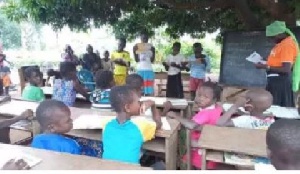Over 8,000 out-of-school children in the Kpandai District of the Northern Region have been enrolled in formal schools after benefiting from the Complementary Basic Education (CBE) programme.
The CBE programme afforded these out-of-school children, who were beyond school starting age (eight to 14), the opportunity to acquire basic literacy and numeracy skills within a period of nine months in their mother-tongues to facilitate their enrolment into the formal school system.
The CBE programme is in its fourth year at the Kpandai District and it is implemented by IBIS in Ghana with funding from the Department for International Development and the United States Agency for International Development.
A tour of some of the formal basic schools at the district where the CBE beneficiaries have been enrolled showed that the pupils were excelling in both academic and extra-curricular activities.
Mr Nikum Kaldo, Headmaster of Tenglinto D/A Primary and Junior High School, where over 400 CBE beneficiaries have been enrolled, said the pupils had settled well in the school adding they excelled in all tasks assigned them.
Mr Kaldo said initially the pupils could not speak English Language but in about two months they improved in the language and became more interactive in class.
Mr Zachariah Sandow, a Project Officer of IBIS in Ghana at Kpandai, said the CBE programme would end at the district next year adding the district has been adequately prepared to take over from IBIS in Ghana to ensure its sustainability.
Mr Sandow said a number of communities were far from schools making it difficult for children to access formal education.
Mr Ugan Kofi, a CBE facilitator at Jetima community, said parents refused to buy basic school items such as clothing, sandals and stationery for their wards, and this was affecting the morale of some the children.
General News of Friday, 22 September 2017
Source: ghananewsagency.org













